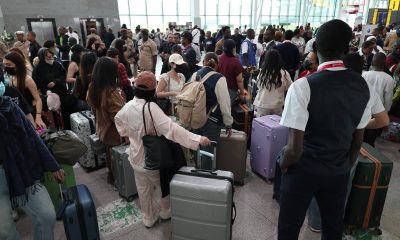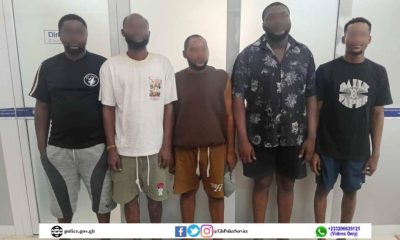Health
WHO Worried New COVID-19 Mu variant ‘Resistant To Vaccines’

The World Health Organisation has revealed that it is monitoring a new coronavirus “variant of interest” named Mu – also known by its scientific name as B.1.621.
This was disclosed by Dr. Margaret Harris, a spokesperson for the WHO, at a UN press briefing in Geneva on Wednesday.
In its weekly epidemiological update, WHO warned that the variant was becoming increasingly prevalent in Colombia and Ecuador and had shown signs of possible resistance to vaccines.
Mu was first identified in Colombia in January 2021, and since then there have been “sporadic reports” of cases and outbreaks in South America and Europe, WHO said.
While the global prevalence of Mu among sequenced COVID-19 cases is below 0.1 per cent, its prevalence had consistently increased in Colombia and Ecuador, where it is now responsible for around 39 per cent and 13 per cent of infections, respectively.
Reports on the variant’s prevalence should be interpreted with due consideration given to the low sequencing capacity of most countries, the agency said.
Mu is the fifth variant of interest to be monitored by the WHO since March.
It has a number of mutations that suggest it could be more resistant to vaccines, the health agency warned, but stressed that further research would be needed to confirm this.
Preliminary data show a reduced effectiveness of vaccines “similar to that seen for the Beta variant”.
The WHO said it would be monitoring “the epidemiology of the Mu variant in South America, particularly with the co-circulation of the Delta variant for changes”.
As of Aug. 29, over 4,500 sequences (3,794 B.1.621 sequences and 856 B.1.621.1 sequences), genome sequences, analysed samples of the virus taken from patients, had been designated as Mu in the past four weeks.
Health
Lassa fever affects 21 states cases increase in Nigeria

The Nigeria Centre for Disease Control and Prevention, NCDC, says Lassa fever has claimed 168 lives across 21 states in 2025.
The agency in its situation report for epidemiological week 38, disclosed a total of 4,543 suspected cases, of which 897 were confirmed positive, with a case fatality rate of 18.7 per cent.
It stated that four states, Ondo, Edo, Taraba, and Bauchi, remain the epicentres of the outbreak, accounting for 67 per cent of all confirmed cases. Ondo alone has recorded the highest burden, followed by Edo and Bauchi.
According to the agency, other affected states include Ebonyi, Benue, Kogi, Gombe, Plateau, Kaduna, Nasarawa, Enugu, Delta, Anambra, Rivers, Borno, Oyo, Ogun, the Federal Capital Territory, and Lagos.
The report also highlighted that most of the confirmed cases were among people aged 21 to 40, with both men and women affected.
The NCDC said this age group is the most socially and economically active, making them more exposed to the rodent-borne disease.
Lassa fever is an acute viral haemorrhagic illness transmitted to humans through contact with food or household items contaminated by the urine or faeces of infected rats.
Health
NAFDAC orders removal of 101 products, warns against sale, use

The National Agency for Food and Drug Administration and Control (NAFDAC) has ordered the withdrawal, suspension and cancellation of 101 products from circulation in Nigeria.
The agency gave the order in a post on its official X handle yesterday, stating that the affected products must no longer be manufactured, imported, exported, distributed, advertised, sold or used in the country.
“This is to inform the general public that the following products are approved for withdrawal, suspension and cancellation by NAFDAC. They are therefore no longer permitted for manufacture, importation, exportation, distribution, advertisement, sale and use within Nigeria,” the statement read.
Related News
NAFDAC orders market removal of 101 products
NAFDAC raises alarm over adulterated palm oil sold by traders
Technological disruption, regulatory changes hindering sustainable healthcare – NAFDAC DG
According to NAFDAC, a product is considered withdrawn when its registration is discontinued at the request of the market authorisation holder, suspended when licensing conditions are no longer met, and cancelled when the agency revokes the registration licence completely.
The list encompasses a wide range of medicines and health products, including antibiotics, diabetes medications, cardiovascular drugs, and insulin injectables.
The agency urged healthcare providers, importers, distributors, retailers and the general public to consult the full list of affected products on its website and ensure strict compliance with the directive
Health
Ebola Virus: NCDC Declares Index Suspects Negative
The Nigeria Centre for Disease Control and Prevention (NCDC) has declared that there was no case of Ebola in the Federal Capital Territory (FCT), after the index patient suspected of having the virus that causes haemorrhagic fever tested negative for Ebola and Marburg disease.
In a statement on his X handle on Friday, the Centre, however, noted that further tests for other VHFs like Lassa and Dengue are ongoing.
“Thanks to early reporting by a traveller and the swift action of vigilant health workers, the risk to the public was minimised.”
It advised the public to seek medical help immediately if they felt unwell, especially after travelling.
The NCDC also advised the public to shun rumours.
“If you feel unwell, especially after travel, seek medical care immediately. Wash hands regularly & practise good hygiene. Avoid contact with anyone showing unexplained fever, bleeding, vomiting, or diarrhoea.
“Rely only on official NCDC updates. Say no to rumours,” the Centre wrote.
The Centre’s update came after the suspect passengers aboard the Rwanda Air to Abuja were thought to have exhibited Ebola-related symptoms.
Similarly, a statement signed by the Director General of NCDC, Dr. Jide Idris, said: “We wish to inform the public that two recent suspected cases of viral hemorrhagic fever in Abuja both tested negative for Ebola and Marburg viruses.
“We are currently testing samples for other viral hemorrhagic fevers like Lassa Fever and Dengue Fever.
“The most recent case involved a traveller who, after returning to Nigeria from Kigali, responsibly presented himself immediately to a hospital in Abuja when he felt unwell.
“His decision to report early, combined with the vigilance of the attending clinician and hospital team, ensured that our public health system was promptly activated and that the risk to the public was minimised.
“This responsible action is highly commendable and a good practice all Nigerians are urged to emulate; when you feel unwell, especially after travel, seek care early. Doing so protects you, your family, and your community.”
-

 News5 days ago
News5 days agoLagos police recovers 75 mobile phones and 5 laptops abandoned by fleeing suspects during routine patrol in Ikeja
-

 News5 days ago
News5 days agoImo Police launch investigation into viral video of its officers allegedly involved in cult activities
-

 News4 days ago
News4 days agoOyebanji is my Greatest Achievement, says Fayemi
-

 News3 days ago
News3 days agoEFCC, NIS, NCoS complete deportation of 192 foreigners convicted for Cyber-terrorism in Lagos
-
News3 days ago
Notorious AAUA cult leader arrested during secret meeting on campus
-

 Entertainment4 days ago
Entertainment4 days agoI’m nothing in Ned Nwoko’s house — Regina Daniels alleges domestic abuse
-
News1 day ago
Lagos govt seals church, several buildings over noise, air pollution
-

 Sports5 days ago
Sports5 days agoFULL LIST: Ajibade, Okoronkwo Nominated For CAF Women’s Player Of The Year award
-
News3 days ago
Army troops recover arms, ammunition in Plateau
-

 Entertainment3 days ago
Entertainment3 days agoSenator Nwoko finally opens up, accuses Regina Daniels of drug abuse
-

 News5 days ago
News5 days agoPolice arrest five members of Inter-State syndicate of fake officers in Kano










